Are you ready to dive into the world of organic gardening? Look no further than Rodale’s Basic Organic Gardening PDF, available for you to download today. Whether you’re a beginner or an experienced gardener, this comprehensive guide will provide you with all the information you need to start and maintain a healthy organic garden.
Key Takeaways:
- Obtain Rodale’s Basic Organic Gardening PDF to get started with organic gardening
- Learn about the benefits of organic gardening, such as avoiding harmful pesticides and chemicals
- Discover practical tips for starting your own organic garden, including selecting the right location and preparing the soil
- Explore various organic gardening techniques, such as companion planting and mulching
- Find additional resources and recommended books to enhance your organic gardening knowledge
- Understand the importance of nurturing a healthy garden through sustainable organic gardening practices
Rodale’s Basic Organic Gardening PDF Resources:
- https://www.yumpu.com/en/document/view/65454906/pdf-file-rodale039s-basic-organic-gardening-a-beginner039s-guide-to-starting-a-healthy-garden-free-online
- https://clevnet.overdrive.com/media/2041282
Organic Gardening Benefits
Organic gardening offers numerous benefits for both the environment and your personal health. By choosing to grow your own organic produce, you can contribute to a more sustainable food system and reduce your exposure to harmful chemicals and pesticides. Here are some key advantages of organic gardening:
- Better for the environment: Organic gardening practices prioritize the use of natural and renewable resources, reducing the carbon footprint associated with conventional agriculture. By avoiding the use of synthetic fertilizers and pesticides, organic gardens promote healthy ecosystems and protect beneficial insects and wildlife from harm.
- Healthier and tastier produce: Organic produce is known for its superior taste and nutritional value. By nurturing your plants with organic fertilizers and soil amendments, you can enhance the flavor and nutrient content of your fruits and vegetables. Studies have shown that organic produce often contains higher levels of vitamins, minerals, and antioxidants compared to conventionally grown crops.
- Avoiding harmful chemicals: Conventional pesticides and herbicides can have detrimental effects on human health. By choosing organic gardening, you can minimize your exposure to these chemicals and reduce the risk of negative health effects such as allergies, respiratory problems, and hormone disruption.
- Promoting biodiversity: Organic gardens support a rich diversity of plants, insects, and microorganisms. By creating a balanced ecosystem, organic gardening practices help to maintain natural pest control and pollination, reducing the need for chemical interventions.
- Building healthy soil: Organic gardening emphasizes the importance of soil health and fertility. By using organic matter such as compost and mulch, you can improve soil structure, retain moisture, and enhance nutrient availability to plants. Healthy soil promotes strong and resilient plants, reducing the risk of pest and disease outbreaks.
With all these benefits, it’s no wonder that more and more people are turning to organic gardening to grow their own food. Whether you have a small backyard or a few pots on a balcony, anyone can start their own organic garden and reap the rewards.
“Organic gardening allows us to reconnect with nature and embrace sustainable practices that benefit both ourselves and the planet.”

One of the best resources to guide you in your organic gardening journey is Rodale’s Basic Organic Gardening guide. This comprehensive PDF offers valuable insights and practical advice for both novice and experienced gardeners. With step-by-step instructions and beautiful illustrations, you’ll learn everything you need to know to create a thriving organic garden.
Getting Started with Organic Gardening
Starting your own organic garden may seem daunting, but with a few simple steps, you’ll be well on your way to growing your own healthy and sustainable produce. Organic gardening not only benefits your health but also promotes environmental conservation and biodiversity. Here are some essential tips to help you get started:
Selecting the Right Location
Choose a location for your organic garden that receives at least six hours of sunlight per day. Ensure that the soil is well-draining and free from contaminants such as chemicals or heavy metals. Consider the proximity to a water source for irrigation purposes. Additionally, make sure the size of the area is suitable for your gardening needs.
Preparing the Soil
Before planting, it’s important to prepare the soil properly. Start by removing any weeds or grass from the area. Then, loosen the soil using a garden fork or tiller. Add organic matter such as compost or well-rotted manure to improve soil fertility and structure. Mix it thoroughly to ensure even distribution.
Choosing Organic Seeds and Plants
When selecting seeds or plants for your organic garden, opt for varieties that are labeled as organic or heirloom. These seeds have not been treated with synthetic chemicals or genetically modified. They are more resilient and can adapt better to natural conditions. Consider planting a diverse range of vegetables, fruits, and herbs to promote biodiversity in your garden.
Understanding Organic Pest Control
Organic pest control focuses on preventing and managing pests using natural methods. This can include techniques such as companion planting, which involves planting certain crops together to repel pests. You can also use physical barriers like row covers or handpicking pests off plants. Additionally, attracting beneficial insects like ladybugs and lacewings can help control harmful pests.
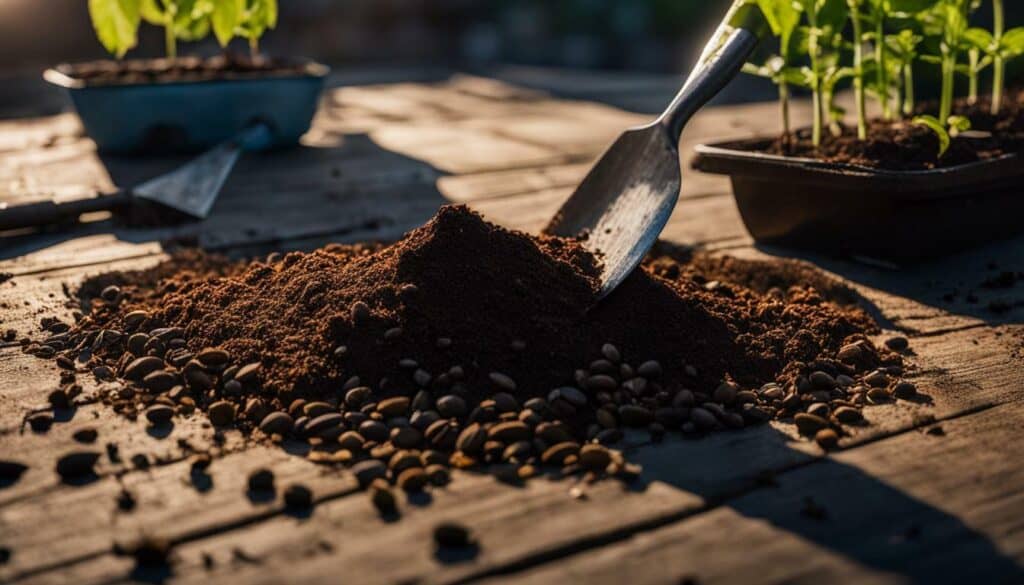
Creating a Watering Schedule
Proper watering is crucial for the success of your organic garden. It’s important to water deeply and infrequently to encourage plants to develop a strong root system. Avoid overwatering, as it can lead to the development of fungal diseases. Consider using a drip irrigation system or watering at the base of plants to minimize water waste.
Implementing Organic Fertilizers
Instead of using synthetic fertilizers, opt for organic alternatives to nourish your plants. Compost, worm castings, and seaweed extracts are excellent sources of nutrients. They provide a slow-release of essential minerals and improve soil health. Apply fertilizer according to the specific needs of each plant, and avoid over-fertilizing, as it can lead to nutrient imbalances.
By following these basic steps, you can start your own organic garden and enjoy the benefits of fresh and nutritious produce. Remember to be patient and observe the needs of your plants, as organic gardening is a journey of learning and discovery.
Organic Gardening Techniques
There are several tried-and-true techniques that can help you achieve success in your organic garden. These methods not only promote the health and productivity of your plants but also contribute to the overall well-being of the environment. By embracing organic gardening techniques, you can create a sustainable and thriving garden that benefits both you and the planet.
One essential technique is companion planting, which involves pairing compatible plants that can enhance each other’s growth and ward off pests. For example, planting marigolds alongside tomatoes can deter harmful insects, while beans planted with corn can help provide nitrogen to the soil.
Crop rotation is another effective technique to prevent the buildup of pests and diseases. By rotating your crops each year, you disrupt the life cycles of pests and reduce the risk of soil-borne diseases. This practice also helps maintain soil fertility by balancing nutrient demands.
Mulching is a simple yet crucial technique that can improve soil health and conserve water. By applying a layer of organic mulch, such as straw or wood chips, you can suppress weeds, retain moisture, and regulate soil temperature. Additionally, the mulch gradually breaks down and adds organic matter to the soil, improving its structure and fertility.
Composting is an integral part of organic gardening, as it allows you to recycle organic waste and create nutrient-rich soil amendments. By collecting kitchen scraps, yard trimmings, and other organic materials, you can create a compost pile or bin that decomposes into nutrient-dense compost. This homemade “black gold” can be used to enrich your garden soil and promote healthy plant growth.
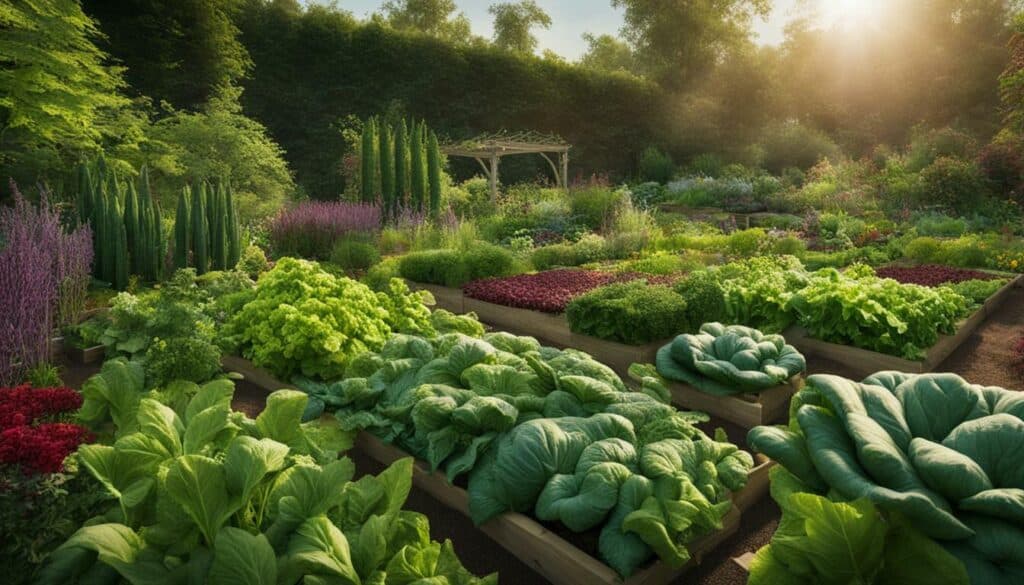
Furthermore, implementing organic pest control methods is essential for maintaining a balance between pests and beneficial insects. By utilizing natural predators, such as ladybugs and praying mantises, you can keep pest populations in check without relying on harmful chemicals. Additionally, using organic sprays made from ingredients like neem oil or garlic can help control common garden pests.
It’s worth mentioning that every garden is unique, and different techniques may work better in specific environments. Experimenting and adapting these techniques to suit your garden’s needs will help you develop a personalized approach to organic gardening.
Remember, organic gardening is not just about the techniques; it’s a holistic approach that embraces the principles of sustainability, biodiversity, and harmony with nature. By incorporating these practices into your garden, you can create a thriving ecosystem that nurtures both plants and beneficial wildlife.
Elevate your organic gardening game with these expert tips and tricks
Organic gardening is not only a sustainable and environmentally friendly practice, but it also allows you to grow healthier, tastier crops. Whether you’re a beginner or an experienced gardener, here are some essential organic gardening tips to help you achieve success in your garden.
1. Watering schedules
Proper watering is crucial for the health of your plants. Avoid over-watering by watering deeply and infrequently, allowing the soil to dry out slightly between watering sessions. This promotes deep root growth and helps plants withstand periods of drought.
2. Weed control
Weeds can compete with your plants for nutrients and water, so it’s important to keep them in check. Use organic mulch, such as straw or wood chips, to suppress weed growth. Hand-pull weeds regularly to prevent them from spreading and smothering your plants.
3. Organic fertilizers
Feed your plants with natural and organic fertilizers to promote healthy growth. Compost, well-rotted manure, and organic seaweed extracts are excellent options. These fertilizers provide essential nutrients without the risk of chemical build-up in your soil.
4. Harvesting techniques
When it comes to harvesting your crops, timing is key. Each crop has its own optimal harvesting time, so be sure to research and understand the specific requirements of your plants. Harvesting at the right time ensures maximum flavor, nutrition, and yield.
“Proper watering is crucial for the health of your plants.”
By following these organic gardening tips, you can nurture a thriving garden while minimizing your impact on the environment. Remember to prioritize biodiversity, promote soil health, and connect with the natural world around you. Happy gardening!
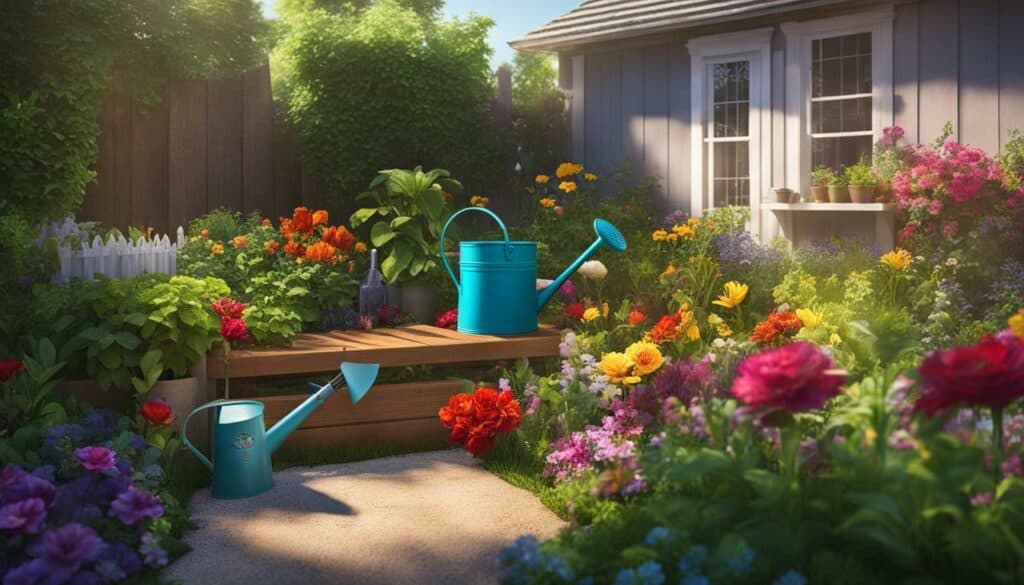
Rodale’s Basic Organic Gardening Guide: Your Ultimate Resource for Organic Gardening
Rodale’s Basic Organic Gardening guide is a must-have resource for anyone looking to expand their knowledge and skills in organic gardening. Whether you are a beginner or an experienced gardener, this comprehensive guide provides valuable information and practical tips to help you create a healthy and thriving organic garden.
Organic gardening has gained popularity in recent years due to its numerous benefits for both our health and the environment. By avoiding harmful pesticides and chemicals, organic gardening promotes biodiversity, produces healthier and tastier crops, and helps protect our natural resources.
If you’re new to organic gardening, getting started can feel overwhelming. However, with the right guidance, it becomes an enjoyable and rewarding journey. Rodale’s Basic Organic Gardening guide offers step-by-step instructions on how to start your organic garden, from selecting the right location to preparing the soil and choosing organic seeds and plants.
To ensure the success of your organic garden, it’s essential to implement organic gardening techniques. This guide explores various techniques such as companion planting, crop rotation, mulching, and composting. These practices improve soil fertility, prevent pests and diseases, and promote overall garden health.
Companion Planting
Companion planting is an organic gardening technique that involves planting different crops together to maximize their growth and repel pests. For example, planting marigolds alongside tomatoes can help deter pests like nematodes.
Crop Rotation
Crop rotation is the practice of changing the location of crops in your garden each season. This helps prevent the buildup of pests and diseases, as different crops have different nutrient needs and attract different pests.
Mulching
Mulching involves covering the soil with organic matter like straw, leaves, or grass clippings. This helps conserve moisture, suppress weeds, and regulate soil temperature.
Composting
Composting is the process of turning organic waste into nutrient-rich compost. It helps improve soil structure, fertility, and moisture retention. Rodale’s Basic Organic Gardening guide provides detailed instructions on how to create and use compost in your garden.
In addition to these techniques, the guide also offers essential organic gardening tips. It covers topics such as watering schedules, weed control, organic fertilizers, and harvesting techniques. These tips will help you optimize your gardening practices and achieve the best results.
Rodale’s Basic Organic Gardening guide stands out for its user-friendly format and comprehensive coverage of all aspects of organic gardening. It is a valuable resource that empowers both beginners and experienced gardeners to cultivate healthy and sustainable gardens.
If you are passionate about organic gardening or want to embark on a new gardening adventure, obtaining Rodale’s Basic Organic Gardening PDF is essential. It provides the knowledge and guidance you need to nurture a healthy garden and enjoy the benefits of organic gardening practices.
Explore these additional resources to deepen your understanding of organic gardening and connect with like-minded individuals.
Organic gardening is a journey of continuous learning and growth. To expand your knowledge and connect with a community of passionate gardeners, consider exploring the following resources:
Regenerative Agriculture and the Soil Carbon Solution
Our newest white paper compiles the explosive amount of new science around soil carbon sequestration to identify regenerative agriculture as a path toward a new climate future.
The Power of the Plate: The Case for Regenerative Organic Agriculture in Improving Human Health
Developed in partnership with medical professionals, this white paper offers a holistic analysis of the rise of industrial agriculture, the connection to our poor diets and nutrition, and solutions to move towards regenerative healthcare.
The Truth About Organic
This guide will give real, honest, and clear answers about the biggest questions and myths surrounding organic agriculture and what it means for you.
A Simple Guide to Vermicomposting
If regular backyard composting isn’t an option for you, vermicomposting—or worm composting—might be for you! This guide will help you get started.
Striped Cucumber Beetle Field Guide
This field guide presents a pragmatic and systematic approach to organic pest management systems for cucumber crop production.
Backyard Composting Basics
If you’ve ever considered turning your organic waste into a homemade compost, this cheatsheet will give you the basics of how to get started.
Beyond Black Plastic
While black plastic is allowed in organic farming, it is still bad for the environment. With this guide, you’ll learn about safer alternatives.
Vertical Gardening in an Urban Environment
Want to grow food in urban environments? Vertical gardening may be the answer. Learn how to get started here.
Water Purification
Read about how Rodale Institute constructed a wetlands system with rainwater catchment component to reduce our water waste.
Roller Crimper Blueprints
Large-scale organic no-till farmers can utilize the roller crimper, developed at Rodale Institute, to terminate cover crops. These blueprints will help you obtain your own.
Read New Farm Magazine
Hear firsthand from farmers when you read our issues of New Farm — a publication that promotes certified organic farmers across the nation.
These resources will provide you with valuable insights, practical tips, and inspiration to further enhance your organic gardening journey. Remember, learning is a lifelong process, and with the right knowledge, you can create a thriving and sustainable garden.
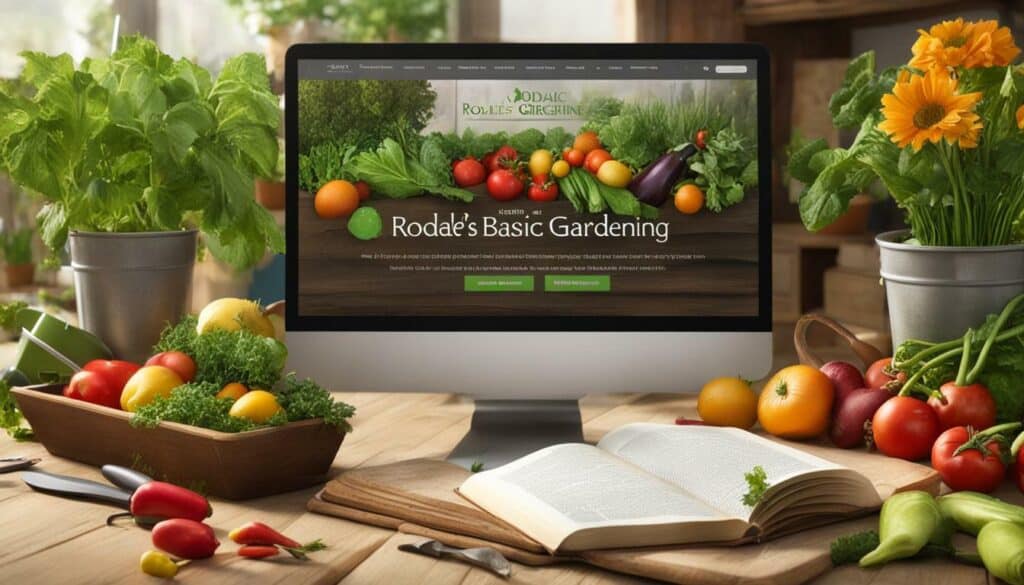
By exploring these additional resources, you’ll be equipped with the tools and knowledge to take your organic gardening to the next level. Connect with like-minded individuals, learn from experts, and continue to contribute to the organic movement. Happy gardening!
Organic Gardening Practices: Beneficial for Your Garden and the Planet
Organic gardening practices are not only beneficial for your own garden, but also for the planet as a whole. By adopting organic gardening techniques, you can create a thriving ecosystem that supports biodiversity, improves soil health, and reduces environmental impact. Here are some key organic gardening practices to implement in your own garden:
Biodiversity and Companion Planting
One of the fundamental principles of organic gardening is promoting biodiversity. By planting a variety of crops and flowers, you can attract beneficial insects, birds, and other wildlife that help control pests and pollinate your plants. Companion planting is a technique where certain plants are grown together because they provide mutual benefits. For example, planting marigolds alongside tomatoes can deter harmful insects and improve the overall health of your tomato plants.
Crop Rotation
Crop rotation is another important organic gardening practice that helps prevent the build-up of pests and diseases in the soil. By rotating your crops each year, you can disrupt the life cycle of pests and reduce the risk of soil-borne diseases. For example, planting legumes, such as beans or peas, in one season and then planting brassicas, like broccoli or cabbage, in the following season can help break the pest and disease cycle.
Mulching and Composting
Mulching and composting are essential techniques for improving soil fertility and moisture retention. Mulching involves covering the soil with organic materials, such as straw or wood chips, to suppress weeds, retain moisture, and regulate temperature. Composting, on the other hand, is the process of decomposing organic matter, such as kitchen scraps and yard waste, to create nutrient-rich compost. Adding compost to your garden beds enhances soil structure, provides essential nutrients to your plants, and promotes beneficial soil microorganisms.
Watering and Pest Control
Watering your garden efficiently and practicing organic pest control methods are also key aspects of organic gardening. It’s important to water deeply and infrequently, allowing the soil to dry out between watering sessions. This promotes the development of deep roots and reduces water waste. When it comes to pest control, organic gardeners rely on natural solutions, such as handpicking pests, introducing beneficial insects, and using organic insecticidal soaps or oils.
Harnessing the Power of Organic Fertilizers
Organic gardening avoids the use of synthetic fertilizers and instead relies on natural sources of nutrients. This includes using compost, aged manure, bone meal, and other organic fertilizers. Organic fertilizers release nutrients slowly and nourish the soil, creating a balanced and sustainable growing environment for your plants.
Encouraging Sustainable Practices
By adopting organic gardening practices, you are not only growing healthy food for yourself but also contributing to the overall sustainability of our planet. Organic gardening minimizes the use of harmful chemicals and pesticides, reduces water pollution, and promotes a more balanced and resilient ecosystem. It allows you to connect with nature, appreciate the value of natural systems, and become a steward of the environment.
Organic gardening practices are not only beneficial for your own garden, but also for the planet as a whole.
By implementing these organic gardening practices, you can create a thriving garden that not only provides you with fresh, nutritious produce but also supports the health of our environment. Start today and experience the joy of organic gardening!
Exploring the World of Organic Gardening Books
If you’re looking to delve deeper into the world of organic gardening, these books are a great place to start. Whether you’re a beginner or an experienced gardener, these resources will provide valuable guidance, inspiration, and knowledge to help you cultivate a thriving organic garden.
- Rodale’s Basic Organic Gardening: A Beginner’s Guide to Starting a Healthy Garden – This comprehensive guide by Rodale Institute covers all the essentials of organic gardening. From understanding soil health to choosing the right plants, this book offers practical advice and step-by-step instructions to help you get started on your organic gardening journey. With detailed explanations and beautiful illustrations, it’s a must-have resource for any gardener.
- The Organic Gardener’s Handbook: How to Create an Abundant Garden on a Small Piece of Ground – Written by Frank Tozer, this book focuses on maximizing productivity in small spaces. It offers innovative techniques for organic gardening, such as vertical gardening and square foot gardening, to help you make the most of limited space. With clear instructions and helpful tips, this book is perfect for urban gardeners or anyone with a small backyard.
- The Vegetable Gardener’s Bible – Authored by Edward C. Smith, this book is a comprehensive guide to growing vegetables organically. It covers everything from planning and planting to harvesting and storage. With detailed information on hundreds of vegetable varieties, as well as troubleshooting advice for common problems, this book is an invaluable resource for vegetable gardeners of all levels.
These books will provide you with a solid foundation in organic gardening principles and techniques. They will inspire you to cultivate a garden that is not only productive but also in harmony with nature.

“Organic gardening is not just a hobby; it is a way of life that promotes sustainability, environmental stewardship, and the well-being of both humans and the planet. These books will equip you with the knowledge and skills to become a successful organic gardener.”
Nurturing a Healthy Garden with Organic Gardening
Organic gardening is more than just a hobby – it’s a way of nurturing a thriving ecosystem right in your own backyard. By adopting organic gardening practices, you not only produce healthy and delicious crops but also contribute to the overall health and sustainability of the environment. Here are some essential organic gardening practices to help you cultivate a flourishing garden.
Promote Biodiversity
Biodiversity plays a crucial role in maintaining a healthy garden. By cultivating a diverse range of plants, you can create a balanced ecosystem that supports beneficial insects, pollinators, and natural pest control. Companion planting is an effective technique that involves growing compatible plants together to maximize their growth and deter pests. For example, planting marigolds alongside tomatoes can help repel harmful insects.
Practice Crop Rotation
Crop rotation is an important practice in organic gardening that helps prevent the buildup of pests and diseases in the soil. By rotating your crops each year, you can disrupt the life cycles of pests and reduce the risk of soil-borne diseases. For example, avoid planting the same family of vegetables in the same spot year after year.
Implement Mulching
Mulching is an effective method to suppress weeds, conserve soil moisture, regulate soil temperature, and improve overall soil health. Organic mulches, such as straw, leaves, or compost, can be applied around the base of plants to prevent weed growth and provide nutrients as they break down. This not only saves time and effort in weeding but also enhances soil fertility.
Embrace Composting
Composting is a natural process that transforms organic waste into nutrient-rich compost, which can be used to improve soil fertility and structure. By composting kitchen scraps, yard waste, and other organic materials, you can create a valuable resource for your garden. Compost provides essential nutrients to plants, improves soil moisture retention, and promotes beneficial microbial activity.
Water Wisely
Watering your garden efficiently is essential for both plant health and water conservation. To avoid overwatering, which can lead to root rot and disease, water deeply and infrequently. Mulching can help retain soil moisture and reduce the need for frequent watering. Additionally, consider using rainwater harvesting systems to capture and store rainwater for irrigation.

By practicing these organic gardening techniques, you can nurture a healthy garden that thrives without the use of harmful pesticides and synthetic chemicals. Remember, gardening is a journey of learning and experimentation, so don’t be afraid to try new methods and adapt to the unique needs of your garden. Enjoy the process and revel in the beauty and rewards of organic gardening.
Conclusion
With Rodale’s Basic Organic Gardening PDF in hand, you have all the tools you need to embark on a rewarding journey of organic gardening. Don’t hesitate, start your sustainable gardening adventure today!
Organic gardening offers numerous benefits, from growing healthier and tastier crops to supporting biodiversity and avoiding harmful chemicals. By choosing organic gardening, you are not only improving your own well-being but also contributing to the health of the environment.
Getting started with organic gardening may seem daunting, but with the right guidance, anyone can do it. Rodale’s Basic Organic Gardening guide provides a comprehensive resource that covers everything you need to know, from selecting the right location to understanding organic pest control.
Throughout your organic gardening journey, it’s important to implement various techniques and practices that promote soil fertility, prevent pests and diseases, and support overall garden health. Companion planting, crop rotation, mulching, and composting are just a few examples of the organic gardening techniques you can explore.
Additionally, there are plenty of tips and tricks that can help you achieve organic gardening success. From establishing a proper watering schedule to using organic fertilizers and implementing effective weed control, these tips will ensure your garden thrives.
While Rodale’s Basic Organic Gardening guide provides extensive information, it’s always beneficial to explore additional resources. Websites, books, online communities, and local organizations can provide further support and inspiration on your organic gardening journey.
By practicing organic gardening, you are not only nurturing a healthy garden but also promoting sustainability and connecting with the natural world. Embrace the joy and satisfaction of growing your own food and knowing it’s free from harmful chemicals.
So, why wait? Get your hands on Rodale’s Basic Organic Gardening PDF and start your organic gardening adventure today. Whether you’re a beginner or an experienced gardener, this guide will equip you with the knowledge and tools to create a thriving garden that benefits both you and the environment.
FAQ
Q: What is organic gardening?
A: Organic gardening is a method of growing plants without the use of synthetic chemicals, pesticides, or genetically modified organisms. It focuses on promoting soil health, biodiversity, and sustainability to produce healthy and nutritious crops.
Q: Why is organic gardening beneficial?
A: Organic gardening offers several benefits, including avoiding harmful chemicals that can impact human health and the environment, promoting biodiversity by attracting beneficial insects and wildlife, and producing crops that are tastier and more nutritious.
Q: How do I start organic gardening?
A: To start organic gardening, choose a suitable location for your garden, prepare the soil by adding organic matter, select organic seeds and plants, and implement organic pest control methods. It’s also important to learn about composting and natural fertilizers.
Q: What are some organic gardening techniques I can use?
A: There are various organic gardening techniques to consider, such as companion planting (growing compatible plants together to enhance growth and repel pests), crop rotation (changing the location of crops each year to prevent soil depletion), mulching (covering the soil with organic materials to conserve moisture and suppress weeds), and composting (turning organic waste into nutrient-rich fertilizer).
Q: Do you have any tips for successful organic gardening?
A: Yes! Some essential tips for organic gardening include maintaining a regular watering schedule, practicing weed control through mulching and hand weeding, using organic fertilizers or compost, and properly harvesting your crops to ensure their continued productivity.
Q: What does Rodale’s Basic Organic Gardening guide offer?
A: Rodale’s Basic Organic Gardening guide is a comprehensive resource that covers all aspects of organic gardening. It provides step-by-step instructions, gardening tips, plant profiles, and troubleshooting advice to help both beginners and experienced gardeners create thriving, organic gardens.
Q: Are there any additional resources for organic gardening?
A: Yes, there are several additional resources available to support your organic gardening journey. These include websites dedicated to organic gardening, books written by experts in the field, online communities where you can connect with fellow gardeners, and local organizations that offer workshops and events related to organic gardening.
Q: What are some benefits of practicing organic gardening?
A: Practicing organic gardening has numerous benefits, including improving soil health and fertility, reducing chemical runoff into water sources, supporting pollinator populations, and contributing to overall environmental sustainability.
Q: Can you recommend any organic gardening books?
A: Absolutely! Some highly recommended organic gardening books include “The Organic Gardener’s Handbook of Natural Pest and Disease Control,” “Rodale’s Basic Organic Gardening,” “The Organic Farmer’s Business Handbook,” and “The Organic Seed Grower.”
Q: Why is nurturing a healthy garden important in organic gardening?
A: Nurturing a healthy garden is vital in organic gardening because it encourages biodiversity, supports beneficial insects and wildlife, and helps create a balanced ecosystem. It also promotes long-term sustainability and allows you to connect with the beauty and harmony of nature.
Is the “Gardening Basics for Dummies PDF” Guide as comprehensive as the Rodale’s Basic Organic Gardening PDF?
The Gardening Basics for Dummies PDF Guide may be as comprehensive as the Rodale’s Basic Organic Gardening PDF, but it offers a simplified approach through easy gardening basics for dummies. Whether you’re a novice or an experienced gardener, this guide can provide valuable tips and techniques to help you create a thriving garden.

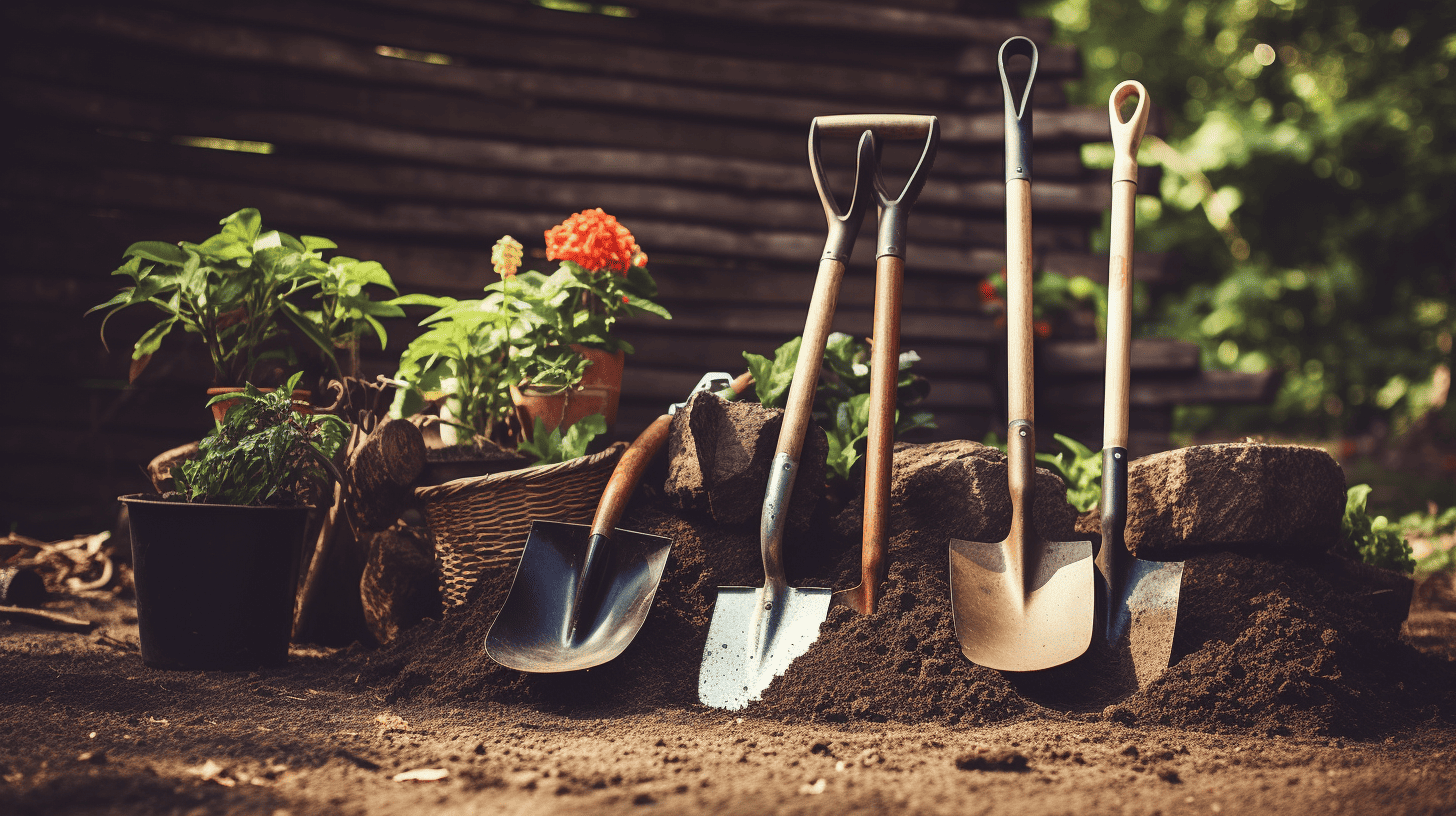
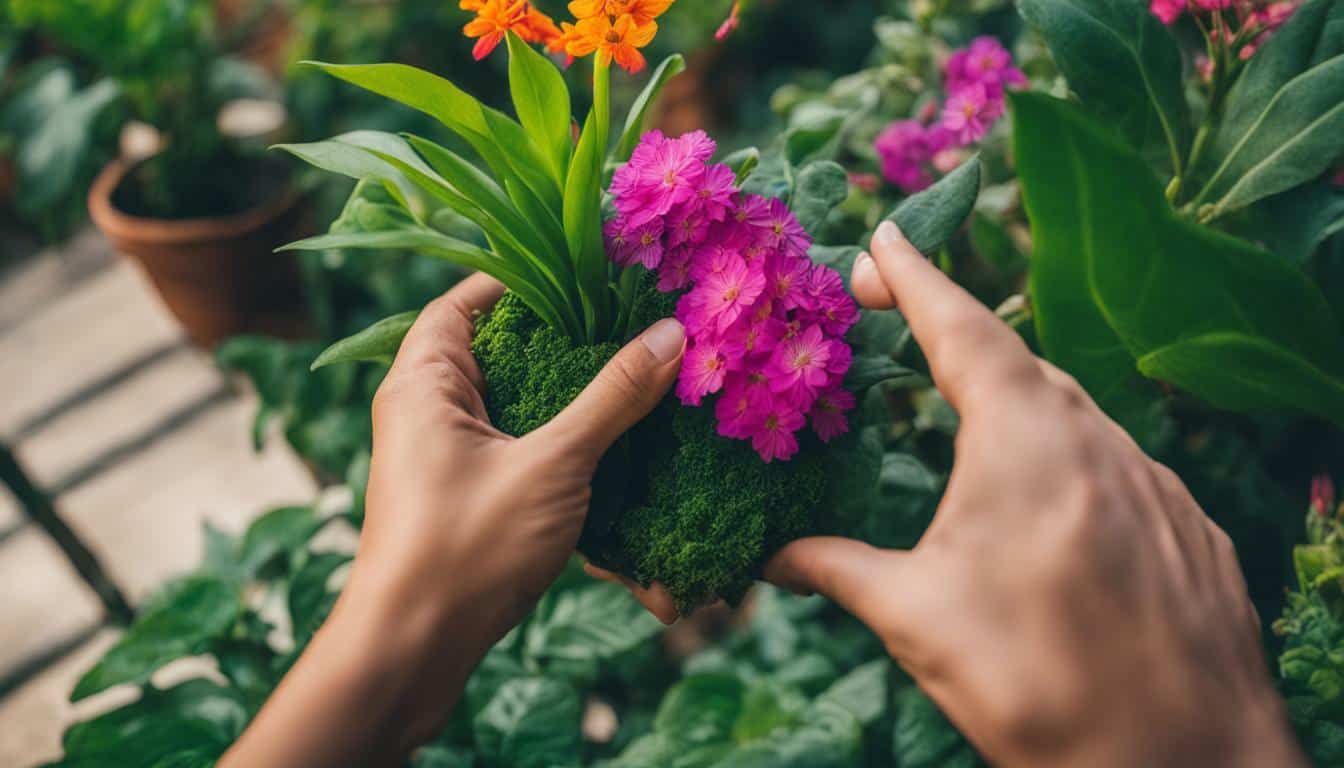
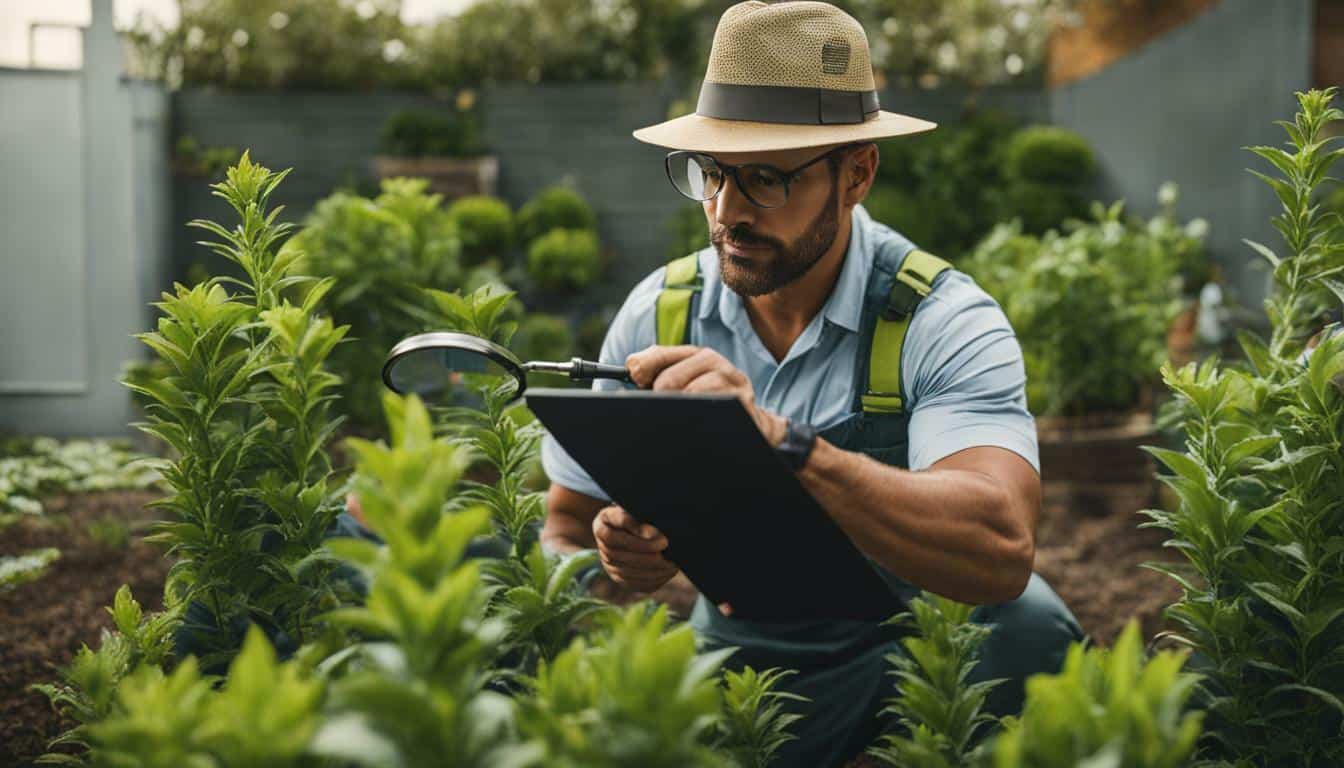

Leave a Reply